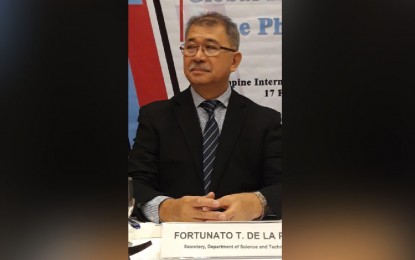
BOOSTING GII RANKING. DOST Secretary Fortunato dela Peña says he is thinking of different strategies to further boost the country's Global Innovation Index (GII) ranking, after attending a closed-door meeting with other agencies on Monday (Feb. 17, 2020) in Manila. The Philippines rose to number 54 in ranking, up 19 notches from its previous ranking of 73 in 2018. (Photo courtesy of DOST)
MANILA -- The Department of Science and Technology (DOST), along with other government agencies, held a closed-door meeting on Monday to discuss ways to boost the country's Global Innovation Index (GII) ranking.
GII is a ranking of world economies based on innovative capabilities. In 2019, the Philippines rose to number 54 in ranking, up 19 notches from its previous ranking of 73 in 2018 and 2017.
"We discussed an overview of the GII. We had to make it (meeting) closed door so that we, officials, could understand where we are right now, and where we would go," said DOST Undersecretary Rowena Cristina Guevara in a press conference.
DOST Secretary Fortunato dela Peña said he is considering some measures to boost the GII ranking.
Among these include the choice of sectors that the DOST would focus on.
"We want to have more collaboration in the areas of agriculture, health, emerging technologies, and basic research," he shared.
For agriculture, dela Peña said the DOST would focus on the coconut industry because this has the potential, and would also look into native livestock and alternatives to pork.
Research and development (R&D) on diagnostics would be the focus in health industry collaboration, while the transport system would be the focus in emerging technologies as dela Peña noted he would like to reduce dependence on importation.
Speaking about R&D, dela Peña said the DOST has been closely looking into the actual allocation of its limited resources.
"That is why we are very tough in screening (research) proposals. We would like to invest on researches that would give the best returns," he remarked.
Also included in the measures he is considering are strengthening information dissemination and branding.
"I meet a lot of people during forums, and many of them -- businessmen, government officials -- would say 'I did not know you (DOST) are doing that'," he said.
Dela Peña continued that someone commented earlier that the DOST's "Filipinovation" (Filipino innovation) logo looks good, giving him the idea to work on branding.
For the measures that the DOST has already been doing, dela Peña said it would continue supporting startups, and would continue partnering with different government agencies.
He cited as an example in which the Department of Public Works and Highways (DPWH) has tapped the DOST in checking the "health" of bridges. Dela Peña said he looks forward to more partnerships with other agencies as well.
Measures taken
Guevara, on the other hand, mentioned four strategies the DOST has been doing, which she said may have contributed to the increase in the country's GII ranking.
"On strengthening human capital, we have invested 25 percent of our funding for the human resource development," she said.
The DOST only had 1,250 freshmen scholars in Science and Engineering. The figure rose to 9,000 in 2019, Guevara said.
In terms of strengthening business incubation and acceleration efforts, Guevara noted that for the last five years, the country has established 44 business incubators. "They (incubators) are already producing startups, and these startups are making money," she commented.
Another strategy is regenerating policy environment for innovation. "In 2009, we had the Technology Transfer Act. Last year, we had the Philippine Innovation Act, and the Innovative Startup Act. We signed the IRR (implementing rules and regulations) for both of these this year," Guevara said.
The Innovative Startup Act recognizes the importance of creating new jobs and opportunities, improve production, and advance innovation and trade in the country through startups; while the Philippine Innovation Act aims to harness innovation efforts to help the poor and the marginalized, and enable micro, small and medium enterprises (MSMEs) to be part of the domestic and global supply chain.
Finally, Guevara said that in terms of upgrading the Filipino's interest in culture of innovation, she noted that the DOST has programs that expand the capability of universities to innovate.
"In 2016, there were only 85 universities involved in R&D funded by the DOST. Last year, we already had 148. So the number is increasing," she said.
The other agencies involved in the Technical Meeting and High-Level Conference on Global Innovation Index in the Philippines held in Manila were the Department of Trade and Industry, National Economic and Development Authority, and the Department of Information and Communications Technology. (PNA)
